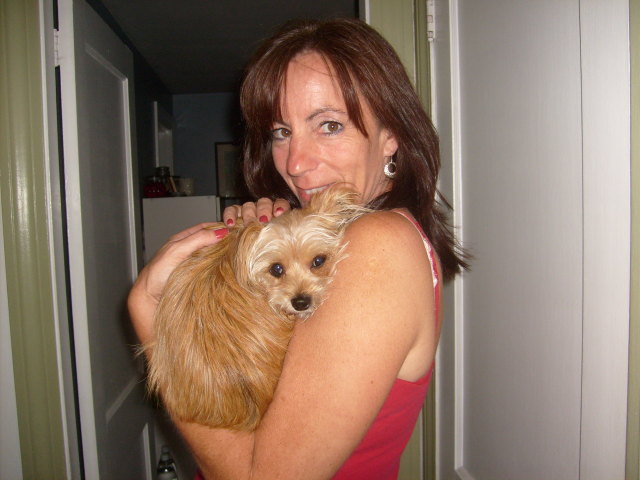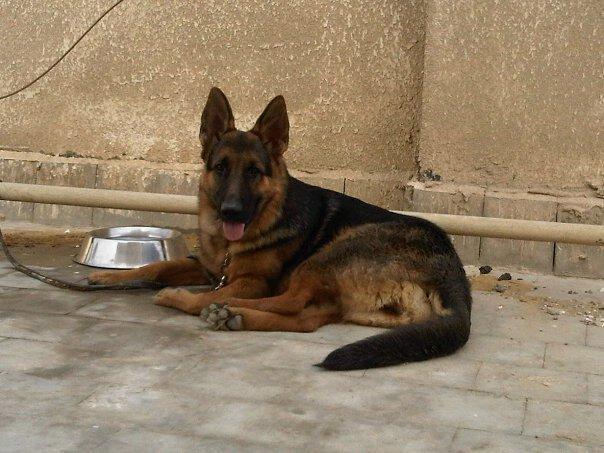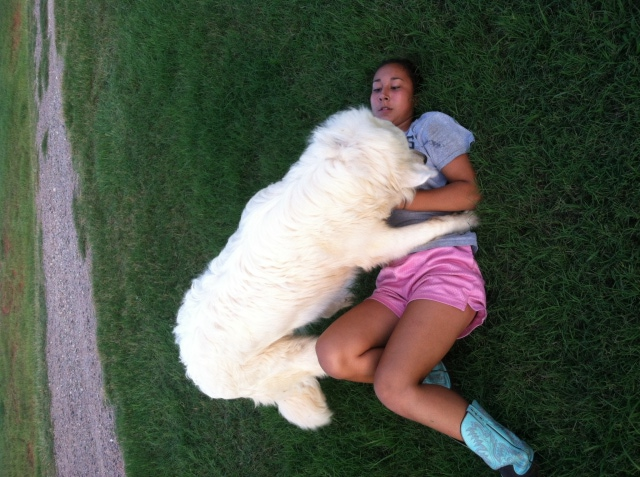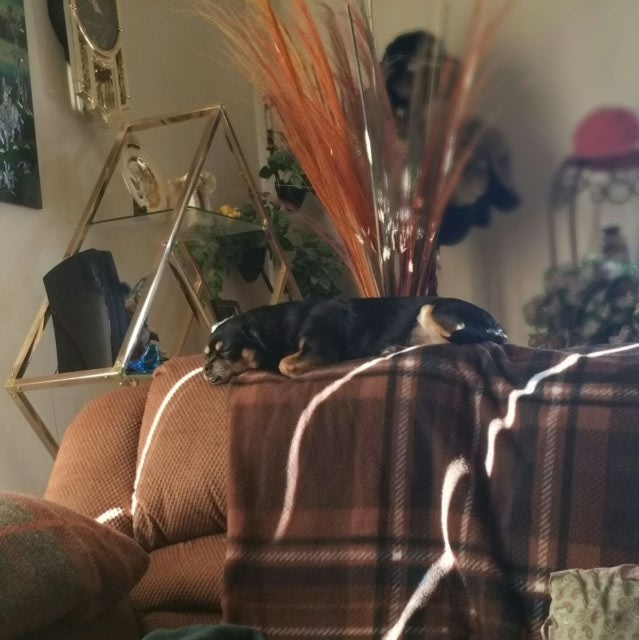QuestionHello there!
We have a new (3 month old) shih-tzu puppy that we've had for a month now. He's doing really well (considering he's a new puppy) but we have a few questions/concerns. I was hoping you could help!
1) separation anxiety: we leave him for about 9 hours a day, alone, in a pen in our kitchen. He has plenty of toys, a Kong, water, his bed, and pee pads. It's also quite large (enough space for him to run and play, but not too large where he can't differentiate his potty area from his water/play/sleeping area). We did not do this as first, as we thought he was too young for it (we had a puppy sitter at first). But now that's he's 3 months old, he seems to be getting more and more used it as the days go on. Our roommate is often home around noon, to give him a quick potty break also. And we feed him in the morning, before we leave, and make sure to take him outside to eliminate and play with him well before we leave. We also make sure to leave without a big fuss (no goodbyes, etc. that he can associate with us leaving). Yet, he still whines when we leave (I can often hear him from inside the garage and it just tears me up!), and seems to "punish" us by eliminating and pooping in the wrong area(s) on some days (i.e. not on the pad, or even near it. And sometimes even near his bed or on it). What are we doing wrong? Is there anything more we can do? I just can't stand to think of him crying (and/or barking! which would be very bad, as our neighbors may get annoyed) all day while we're gone. And I don't want him to be unhappy while we're gone either. I usually see his toys in the same spot as they are when we leave, so I don't think he ever relaxes and plays or sleeps. I can't help but picture him just waiting by the door for us to come home all day, and this just kills me :(
2) leash training: he refuses to walk on a leash. We've tried several things, including praise, treats, and simply dragging him (gently, of course). He simply won't do it. He just sits there and won't move. We need him to go outside to eliminate, so oftentimes, we'll just let him walk without it. He stays very close to our feet (we practice being the Alpha every day), which is good, but we really want/need to train him with the leash. Any tips or advice on this?
3) eating poop: he does it almost every time he poops. We tried picking him up and trying to get him to go in another direction, which sometimes works, but he'll always go back to the area of grass where the poop is, and try to eat it. We've tried giving him a treat and praise for pooping (which, I've heard, helps with potty training), which works for a minute while he eats his treat, but the minute he's done, he goes back for the poop. We try all kinds of distractions, which work for a minute or so, but then he always ends up going back to the poop! Even if we take him on a run to somewhere else, he'll go back to the poop 5 mins later. So, we usually end up picking him up and bringing him back to the house instead of walking him, which forces us to discontinue our "walk training"! I know its bad to "give in" when they're young, but we just don't know what else to do. Please help!
4) eating: he only likes to eat if we sit next to his bowl. If we walk away, he'll stop eating and come to us. We feed him twice a day, at the same time each day. The morning feed is the worst. He rarely eats it because we refuse to sit there while he eats it (we tried this while he was young, but it proved to be unbearable and sometimes impossible for us to do). At night, it's usually ok because we feed him in an area near our dining table, and eat our dinner while he eats his. So he does get at least one meal a day. But in the morning, he just seems so distracted/uninterested. It may be because he's gotten to know that the morning feed means we may be leaving soon (which goes back to the separation anxiety thing!). I'm just worried about him not getting enough to eat. We are thinking about changing his puppy food, but since he seems to like it at night, we don't know if this will even be effective.
5) teething/biting: all he wants to do when he's near us, is bite our fingers and toes. I know he's teething and getting his puppy teeth, but "NO!" commands do not work. He still just tries to bite/nip, which makes it really hard to pet him and give affection sometimes. I know he's a puppy and will probably eventually get over this (especially with constant training with the "NO!" command over time), but I just don't want him to learn to bite people and/or children.
6) humping: if ever another male puppy comes around, it's all he wants to do. I've heard this may be a domination thing? Also, he humps all stuffed animals we give him. He almost becomes obsessed with it, panting and barking and getting pretty riled/worked up about it. Should we worry? He's not neutered yet, as he's too young, and we do plan on having that done as soon as it's physically possible (we've heard we can do it soon, probably around 4 months, or when both testicles drop). Does this have something to do with it?
We're really trying to have a healthy and happy puppy, and most often, he is just that. And he's very smart. But there are just a few things I want to address before they become bad habits we cannot break! If you have any advice at all, please let us know.
Thank you!
~Nicole M.
Answer1 I would work at finding a back up for you roommate so he is never left more than 4-5 hours. Then I would crate him. It is only natural that a puppy resists its crate at first. What the puppy wants more than anything else is to be others, you, anyone else in the household, and any other pets. In our modern society, even if we are home, other things distract us from the attention an uncrated puppy must have. The only real solution is to crate the dog when you aren't around. The dog may be happier in its den than loose in the house. It relaxes, it feels safe in its den. It rests, the body slows down reducing the need for water and relieving its self. Dogs that have been crated all along do very well. Many of them will rest in their crates even when the door is open. I think the plastic ones give the dog more of a safe, enclosed den feeling. Metal ones can be put in a corner or covered with something the dog can't pull in and chew. Select a crate just big enough for the full grown dog to stretch out in.
Leave it some toys. Perhaps a Kong filled with peanut butter. Don't leave anything in the crate the dog might chew up. It will do fine without even any bedding. You will come home to a safe dog and a house you can enjoy.
A dog that has not been crated since it was little, may take some work. Start out just putting its toys and treats in the crate. Praise it for going in. Feed it in the crate. This is also an easy way to maintain order at feeding time for more than one dog.
The "shut the puppy in a safe room" is a fallacy. Very few houses even have a safe room. How many of us have a room with a hard surfaced floor and nothing else? Most rooms have electrical cords to chew if nothing else. In addition to destroying anything a bored puppy finds to chew, it may choke or have intestinal blockage from the pieces. I had a friend that left her dog in a "safe" room. It ate a hole in the floor covering. The safe rooms fail to give the dog the comfort of the enclosed space their instinct requires. Nor do they restrict activity extending the time the dog can go without relieving itself.
2 If getting out in front and coaxing doesn't get a puppy moving, try dropping behind it and running by in baby steps calling ''Go, go, go!'' In a happy, excited voice.
3 The best solution to stool eating, coprophagy, is cleaning them up before the dog has a chance. You can try food additives, the home remedies pineapple juice or canned pumpkin or the commercial products Forbid or Deter.
Why dogs do it is poorly understood. It may be diet related, but changing the dog's diet might cause worse problems. Whatever problems it causes for the owner, it doesn't seem to hurt the dog unless you are trying to clear up a worm infestation.
For more information see http://home.gci.net/~divs/behavior/coprophagia.html
4 Often eating problems come from over feeding. Your dog definitely should be narrower at the waist than the hips and chest. You should be able to easily feel the ribs, but not see them. Each dog is different. Standard recommendations are a good place to start, but each dog must have its food and exercise adjusted to its individual needs. Here is a link to a good illustrated guide, http://www.longliveyourdog.com/twoplus/RateYourDog.aspx
I would not change the chow. The worst thing you can do is to bribe a dog with rich foods into eating more than it needs. Instead, Put down the dish with what the dog should eat, and give it 15 minutes to eat. Then take it up. Do not give it anything to eat until its next scheduled meal. In a few days, it should be eating what it needs. Continue to check its ribs and adjust the food as needed. This is not easy. I had a Shepherd go 3 days on a few nibbles. I was a wreck, but she was fine. It is almost unknown for a healthy dog not to eat what it needs. Unfortunately, in too many cases, it is less than the package says, and less than the owner thinks the dog should have. Many dogs are quite good at holding out for tastier chow. Like kids, sometimes it calls for tough love.
5 Young Labs, which I know best, and other puppies tend to very bad about biting. You see a litter of them, and all the ones that are awake are biting another one or themselves. I am not even sure they realize that when they are alone, if they quit biting, they would quit being bitten. At 3 to 4 months they are getting their adult teeth, and it seems they spend every waking moment biting or chewing. One thing you can do at that stage is to knot and wet a piece of cloth. Then freeze it. The cooling will soothe the gums. Only let the puppy have it when you are there to watch it. I maintain a Lab's favorite chew toy is another Lab. Otherwise they settle for any person they can. They keep hoping to find one that won't yelp, jerk their hand away, and leave.
You just have to keep on correcting them, hundreds of times, not dozens. Provide sturdy, safe toys such as Kongs and Nylabones. Avoid things they can chew pieces off and choke on them. Keep them away from electrical cords. Crates are essential for most young Labs and other dogs.
6 Yes it is likely dominance. If your vet is willing to neuter hem at 4 months, i would go ahead with it. it heads off some behavior problems before they start and is healthier. You also need to give him leadership. The key to most behavior problems is approaching things using the dog's natural instincts. Dogs see all the people and dogs in the household as a pack with each having their own rank in the pack and a top dog. Life is much easier if the 2 legged pack members outrank the 4 legged ones. You can learn to play the role of top dog by reading some books or going to a good obedience class. A good obedience class or book is about you being top dog, not about rewarding standard commands with a treat. Start at http://www.dogsbestfriend.com/ For more on being top dog, see http://www.dogbreedinfo.com./topdogrules.htm He is still a little young for classes, but you can work at home. Just keep sessions short

 Training....
Question
Me with brady
My dog Brady is a year old, he i
Training....
Question
Me with brady
My dog Brady is a year old, he i
 Delayed German Shepherd Heat
QuestionMy German Shepherd
QUESTION: I have a Ge
Delayed German Shepherd Heat
QuestionMy German Shepherd
QUESTION: I have a Ge
 chihuahua pees on bed
Questionme and boo
QUESTION: I have a 9 month ol
chihuahua pees on bed
Questionme and boo
QUESTION: I have a 9 month ol
 Great Pyrenees
Question
Shirley
We adopted Great Pyrenees femal
Great Pyrenees
Question
Shirley
We adopted Great Pyrenees femal
 What breed is my dog?
Question
Sugar Sugar
I got my dog from an
What breed is my dog?
Question
Sugar Sugar
I got my dog from an